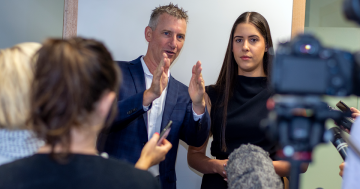Rebecca Muller* urges care to ensure that workplace conflicts don’t flare up as a result of simple misunderstandings.
 We’ve all had those moments where a colleague does something we don’t understand, and we immediately assume the worst.
We’ve all had those moments where a colleague does something we don’t understand, and we immediately assume the worst.
We might take their actions personally (why would they do that to me? ); or we may make it personal about them (why are they being so lazy?).
These bursts of irritability are happening more often these days, according to the American Psychological Association, which makes sense.
The COVID-19 pandemic has undoubtedly increased our stress levels, making us prone to negative thinking.
With this information in mind, though, we can take small steps to reduce our irritability and improve our relationship with co-workers — even when we don’t see eye-to-eye.
It all comes down to assuming positive intent.
When we recognise that other people are not (usually) trying to disappoint us on purpose, we can better regulate our emotions in a moment of stress.
Here are three simple tips to help you assume the best even in a moment of frustration.
Question your gut reaction
When someone does something that irritates you, pause and write down your initial reaction to the situation.
Ask yourself: What do I believe their intention to be?
Sometimes, this act alone will stop your negative thinking in its tracks.
If not, keep writing, and try to identify one way you could see their intentions differently.
So instead of: “They are trying to upset me,” perhaps it’s: “They want to do the right thing; there must have been a miscommunication.”
By pausing to reframe our initial interpretations, we begin to make room for compassion and understanding.
Breathe before you act
If you notice yourself getting worked up with negative emotions, it’s important to pause and take a breath before you approach who frustrates you.
Stepping away from the situation and simply breathing can help us course-correct in the moment, and allow us to find that positive intent.
Practice compassionate directness
Many of us think empathy is something we’re born with, but sometimes, we simply need to practice it.
We can start by applying compassionate directness to our conversations.
The next time someone ruffles your feathers, approach them with calmness and clarity, and see if you can better understand their perspective.
Consider asking them directly: “What was your intention here?” — while also sharing the impact their action had on you.
Having an open and honest conversation will help you connect and problem-solve so that the same issue doesn’t surface in the future.
*Rebecca Muller is the Community Editor at Thrive Global. Her previous work experience includes roles in editorial and digital journalism. She is on instagram @rebeccabmuller.
This article first appeared at thriveglobal.com












